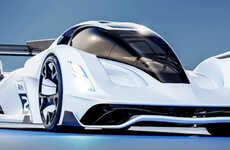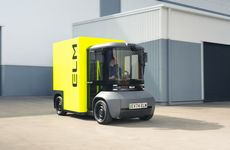
The Fate Of Monaco's Grand Prix
Prince Albert is committed to making Monaco one of the world's most environmentally friendly countries, yet Monte Carlo still hosts its annual toxin-emitting Grand Prix.
After Albert gained sovereignty in 2005, he made it a point to address environmental issues, a subject he is most passionate about. Part of his plan was to small country's overall carbon emissions.
Albert hopes to see a reduction in the number of cars on the roads of Monte Carlo, a city that welcomes thousands of commuters from France and Italy daily. To entice people to use public transit, he ensured trains were frequent, reliable, cheap (one Euro fares), comfortable and fast.
Albert's environmental awareness spurred him to go to the Arctic to see the effects of global warming first hand. Upon his return, he started a foundation to study rising sea levels due to melting glaciers. He is looking at ways to address how his own Mediterranean country will be impacted in the future. Part of his plan is to build an island complete with luxury hotels in anticipation of the rising waters.
The Prince has been in contact with other global leaders in pursuit of a greener future, including Prince Charles. He'll likely spend more time in the U.S. too as he recently bought a mansion in Washington, D.C. to serve as Monaco's U.S. Embassy.
It's bizarre that a country so concerned about the environment still continues to host its annual Grand Prix. The toxic emissions produced by race cars are no doubt ecologically damaging.
I had the rare opportunity to attend last May's Grand Prix, and I can tell you first hand that those cars produce a hefty amount of smoke! Fast, loud, and thrilling, the events really got my heart going. Perhaps I belong to the fortunate few who will get the experience this event. With Albert's commitment to a greener country, this year's race could be one of Monaco's last.
After Albert gained sovereignty in 2005, he made it a point to address environmental issues, a subject he is most passionate about. Part of his plan was to small country's overall carbon emissions.
Albert hopes to see a reduction in the number of cars on the roads of Monte Carlo, a city that welcomes thousands of commuters from France and Italy daily. To entice people to use public transit, he ensured trains were frequent, reliable, cheap (one Euro fares), comfortable and fast.
Albert's environmental awareness spurred him to go to the Arctic to see the effects of global warming first hand. Upon his return, he started a foundation to study rising sea levels due to melting glaciers. He is looking at ways to address how his own Mediterranean country will be impacted in the future. Part of his plan is to build an island complete with luxury hotels in anticipation of the rising waters.
The Prince has been in contact with other global leaders in pursuit of a greener future, including Prince Charles. He'll likely spend more time in the U.S. too as he recently bought a mansion in Washington, D.C. to serve as Monaco's U.S. Embassy.
It's bizarre that a country so concerned about the environment still continues to host its annual Grand Prix. The toxic emissions produced by race cars are no doubt ecologically damaging.
I had the rare opportunity to attend last May's Grand Prix, and I can tell you first hand that those cars produce a hefty amount of smoke! Fast, loud, and thrilling, the events really got my heart going. Perhaps I belong to the fortunate few who will get the experience this event. With Albert's commitment to a greener country, this year's race could be one of Monaco's last.
Trend Themes
1. Environmental Consciousness - The commitment of Prince Albert to making Monaco environmentally friendly opens opportunities for innovative solutions to reduce carbon emissions and promote sustainability in various industries.
2. Public Transit Optimization - Prince Albert's efforts to encourage the use of public transit in Monaco present opportunities for disruption in transportation and mobility industries, such as the development of advanced, efficient, and affordable public transportation systems.
3. Climate Change Adaptation - The Prince's plans to address rising sea levels and create a luxury island highlight opportunities for disruptive innovation in the hospitality and real estate industries, as well as strategies to mitigate the environmental and economic impacts of climate change.
Industry Implications
1. Hospitality - The development of a luxury island to address rising sea levels presents opportunities for disruptive innovation in the hospitality industry, such as designing and building environmentally sustainable resorts and hotels.
2. Transportation - The push for public transit optimization in Monaco opens opportunities for disruptive innovation in the transportation industry, including the development of electric and autonomous vehicles, as well as advanced connectivity solutions for efficient mobility.
3. Real Estate - The need to adapt to rising sea levels in Monaco creates disruptive innovation opportunities in the real estate industry, such as designing and constructing innovative buildings and structures that can withstand and mitigate the impact of climate change.
3.1
Score
Popularity
Activity
Freshness























